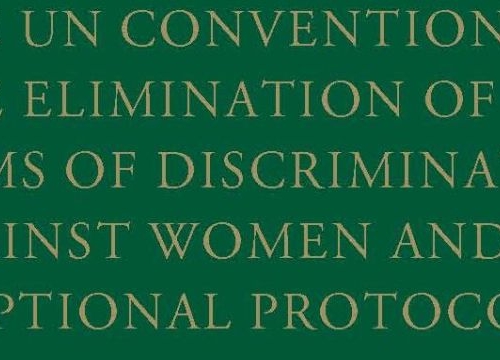Taking Stock: Women’s Rights and Gender-Based Discrimination under Scrutiny at the International Level
Event


OUP
This event celebrates the publication of the second, fully revised and updated, edition of ‘The UN Convention of the Elimination of All Forms of Discrimination against Women and its Optional Protocol. A Commentary’ edited by Patricia Schulz, Ruth Halperin-Kaddari, Beate Rudolf and Marsha A. Freeman.
This commentary provides in-depth scrutiny of the jurisprudence of the United Nations (UN) Committee on the Elimination of Discrimination against Women (CEDAW) in the past decade. Twenty-eight distinguished scholars and practitioners analyze the evolving interpretation of the Convention by the Committee, the threats against women’s rights and gender equality, and the regression, stagnation or progress made in some issues and/or regions. The Commentary also presents the role the Committee plays in setting standards of women’s human rights at the universal level, for instance, thanks to its requirement that States ensure substantive, and not only formal, equality and by making States accountable for the violations of the rights of women by non-State actors in some cases (due diligence obligation).
At this launch event, six panelists will share their views on the fascinating developments and the difficulties of implementing the UN CEDAW Convention and its Optional Protocol as living international law instruments.
Welcome
- Professor Gloria Gaggioli, Director, Geneva Academy of International Humanitarian Law and Human Rights
Moderation
- Patricia Schulz, former CEDAW Committee Member and Rapporteur, Senior Research Associate, United Nations Research Institute for Social Development
Panelists
- Andrew Byrnes, Emeritus Professor of International Law and Human Rights, University of New South Wales (online)
- Ruth Halperin-Kaddari, Professor, Bar-Ilan University and former CEDAW Committee Member and Vice-Chair
- Hilary Gbedemah, Lawyer, Member of the CEDAW Committee and former Chair
- Aruna D. Narain, Puisne Judge of the Supreme Court of Mauritius and former CEDAW Committee Rapporteur and Member
- Beate Rudolf, Professor of Law, Director of the German Institute for Human Rights
- Sulini Sarugaser-Hug, Lawyer, Human Rights Officer, Office of the UN High Commissioner for Human Rights








